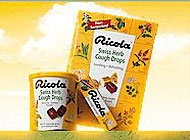
Ricola’s 13 herbs travel around the world

The number 13 is considered by many people to be unlucky, but in 1940 it turned out to be a lucky figure for a Swiss baker in the town of Laufen in what is now canton Basel Country.
Emil Richterich mixed and blended 13 curative herbs to make a herbal sweet that is known throughout the world – Ricola. The name is now synonymous with herb and sugar-free lozenges, cough syrup and herbal teas.
The history of the family company dates back to 1924 when Emil Richterich bought a small bakery in Laufen specialising in confectionery. More than 100 confectionery specialities were produced by the Bleile Bakery, including the “Fünfermocken”, a caramel toffee which at that time cost five centimes and became a favourite for generations of Swiss children.
Richterich founded his company in 1930, with the name Ricola coming from Richterich & Co. Laufen. He loved nature and intensively studied the curative powers of herbs, so much so that by 1940 he had found the ideal recipe for a lozenge made up of 13 herbs.
They are ribwort-plantain, lady’s mantle, elder, marsh mallow, peppermint, thyme, sage, cowslip, horehound, burnet, speedwell, mallow and yarrow.
The resulting herb candy with its unusual shape and intensive flavour was the foundation upon which he built Ricola’s success.
Ricola is run today by Emil Richterich’s grandson, Felix. “We still use the original recipe, which of course I will not tell you exactly. It is still the same. It is a combination of 13 different herbs that have been known for their therapeutic effects for centuries in the Alpine areas,” he told swissinfo.
The company uses no less than 200 tons of dried herbs a year in its products and it is very particular in the way those herbs are cultivated by the 250 farmers throughout Switzerland who produce them.
“Some herbs like more humid soils. Other like more sandy, dry soils so it’s very different from herb to herb. All our herbs are grown organically – that means without pesticides. A lot of the work is by hand so we have a pure quality and an excellent product,” Richterich told swissinfo.
The farmers in Valais, the Emmental, Poschiavo, Jura and central Switzerland lavish great care and attention on the Ricola herbs they grow.
The company is also proud that as a fair business partner, it can guarantee mountain farmers a fixed purchasing agreement which helps safeguard their livelihood.
Ricola uses only those herbs that are grown in a controlled and ecologically sustainable manner. It argues that such herbs are not only more aromatic but also more resilient and provide more of nature’s curative power.
The herbs are harvested when they have the highest possible content of the substances that are important for production. Plants such as thyme, sage and cowslip, whose active ingredients and aromas are stored in their leaves and flowers, are still harvested with shears and scythes.
If local conditions permit, mowing machines may also be used. However, a plough, a spade or a simple potato harvester are used to harvest other herbs, like burnet, which store their valuable ingredients in their roots.
You cannot go past the Ricola manufacturing plant these days without smelling the power of herbs. As the products are manufactured, different aromas fill the air, inviting passers-by to wonder exactly what is being produced.
With annual sales of SFr225 million and production of around 200 million packs of lozenges, Riccola’s 350 employees have plenty on their plate. More than 16,000 tonnes of products are manufactured. But the manufacturing process these days has changed greatly from the early days of the company.
“The herbs are still processed according to the very old recipe but of course the making of the candies, the packing is highly automated with very high-speed sophisticated machinery,” Richterich told swissinfo.
The company’s products have long found their way outside Switzerland, with exports starting in the 1960s and 1970s.
“You can say that there are different kinds of herbal candies which are more popular in one market or another but basically we use the same product all over the world. It’s astonishing that candies sell in warmer countries like Hong Kong or Singapore, where it’s moist and humid, and where you would think that people don’t really need herbal throat candies,” Richterich said.
“But these are very interesting and important markets and the people there eat basically the same flavours as we do here,” he added.
While distribution channels are an important factor in the success of Ricola, advertising also plays an important role in the company’s marketing strategy. Recent Ricola TV commercials have won awards for getting the message across in a way that has viewers laughing at a small but assertive Swiss who makes sure everyone knows that Ricola is from Switzerland.
As to the future, Felix Richterich wants to keep up the momentum and hopes the company will continue to grow.
“We want to expand our distribution. We’re still not very strong in Eastern Europe or Latin America and we also want to be innovative in our product range. We want to develop new items, new flavours and new herbs so that we can keep our brand and our products alive and up to date,” Richterich said.
by Robert Brookes

In compliance with the JTI standards
More: SWI swissinfo.ch certified by the Journalism Trust Initiative

























You can find an overview of ongoing debates with our journalists here . Please join us!
If you want to start a conversation about a topic raised in this article or want to report factual errors, email us at english@swissinfo.ch.